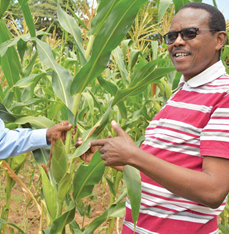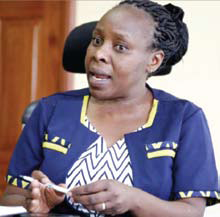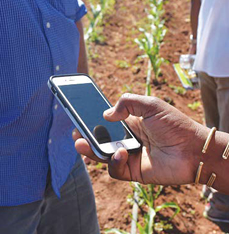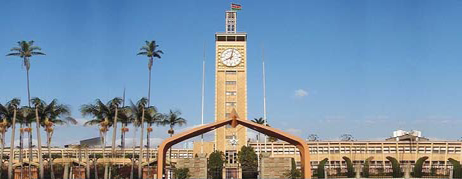Drought-Tolerant Hybrid Seed Offers Farmers Reprieve from Hunger
The scorching heat from the sun does not stop Mary Munini, a middleaged smallholder farmer in Vyulya, Machakos County, from inspecting her distressed maize crop. Traces of worry cloud her face. “I will not harvest anything this season,” she says, visibly downcast.
By Joshua Masinde
 Like many other smallholder farmers spread across the water-stressed counties of Machakos, Makueni and Kitui, in Kenya’s lower eastern region, Munini is staring at a massive crop loss. Prolonged dry spells have for years threatened the food security and livelihoods of many rural families in the region who depend entirely on rain for their agricultural production. Here, most smallholder farmers typically plant farm-saved maize seeds, which lack the attributes to tolerate harsher droughts, extreme heat or water stress. With such conditions, farmers can hardly harvest any maize.
Like many other smallholder farmers spread across the water-stressed counties of Machakos, Makueni and Kitui, in Kenya’s lower eastern region, Munini is staring at a massive crop loss. Prolonged dry spells have for years threatened the food security and livelihoods of many rural families in the region who depend entirely on rain for their agricultural production. Here, most smallholder farmers typically plant farm-saved maize seeds, which lack the attributes to tolerate harsher droughts, extreme heat or water stress. With such conditions, farmers can hardly harvest any maize.
“We just had a little rain at the start of planting. Since then, we have not had any more rain. As you can see, my maize could not withstand the extended dry spell,” says Munini. Like her, over 80 percent of Kenyans depend on maize as their main staple food to supply their dietary requirements, especially in rural areas.
In a neighboring farm, the situation is different. The owner, Kioko Mutua, planted the SAWA hybrid, an improved maize seed variety designed to withstand drought conditions. This variety was developed by scientists at the International Maize and Wheat Improvement Center (CIMMYT) and promoted to Kenyan farmers by Dryland Seed, a local seed company. This initiative to improve maize farmers’ climate resilience in the region was possible thanks to the support of the Bill & Melinda Gates Foundation under the Stress Tolerant Maize for Africa (STMA) project. With the right agronomic practices, the SAWA hybrid can return a yield advantage of up to 20 percent compared to other popular drought-tolerant hybrids in the region, according to Dryland Seed’s managing director, Ngila Kimotho.
 For farmers, weeds are much more than just an eye sore. Along with bugs and plant disease, weeds are a “pest” that damage crops and ruin harvests. Weeds cause problems in farm fields because they steal water, sunlight and nutrients from the crops farmers are working hard to grow.
For farmers, weeds are much more than just an eye sore. Along with bugs and plant disease, weeds are a “pest” that damage crops and ruin harvests. Weeds cause problems in farm fields because they steal water, sunlight and nutrients from the crops farmers are working hard to grow. What are the current issues farmers are grappling with in the county?
What are the current issues farmers are grappling with in the county?  Many Kenyan maize farmers are busy preparing their seed stock for the next planting season. Sowing high quality seeds of stress-tolerant varieties is a cost-effective way for African smallholder farmers to boost their harvests while being resilient to evolving crop pests and diseases as well as an erratic climate. However, even if a majority of farmers buy their seeds, they are often of dubious quality or of old, outdated varieties, which do not cope well against increasing drought and heat shocks or emerging diseases.
Many Kenyan maize farmers are busy preparing their seed stock for the next planting season. Sowing high quality seeds of stress-tolerant varieties is a cost-effective way for African smallholder farmers to boost their harvests while being resilient to evolving crop pests and diseases as well as an erratic climate. However, even if a majority of farmers buy their seeds, they are often of dubious quality or of old, outdated varieties, which do not cope well against increasing drought and heat shocks or emerging diseases. Farmers can sometimes do influence policy and regulation all over the world. If we as farmers and our supporting organisations do not present solutions, others will - as has happened in the Netherlands where the Phosphate Reduction Plan has imposed a forced reduction in livestock numbers on dairy farms.
Farmers can sometimes do influence policy and regulation all over the world. If we as farmers and our supporting organisations do not present solutions, others will - as has happened in the Netherlands where the Phosphate Reduction Plan has imposed a forced reduction in livestock numbers on dairy farms.